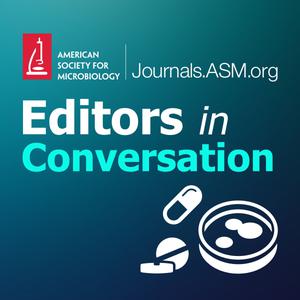
Editors in Conversation
American Society for Microbiology
- 17 minutes 30 secondsGetting a Job in a Clinical Microbiology Lab
Looking for a dynamic and rewarding career? Learn what it means to be a Clinical Microbiology Laboratory Director and the necessary steps to get there. It’s a diverse job encompassing infectious diseases diagnostic testing, patient care, teaching, and research. This episode is geared for those who are interested in pursuing (or already have) a Ph.D. or M.D.
Guests:- Alexandra Bryson, Ph.D.
- Andrea Prinzi, Ph.D
- Join ASM for up to 50% off the publication fees when you publish in JCM or any of the ASM journals.
This episode of Editors in Conversation is brought to you by the Journal of Clinical Microbiology and hosted by JCM Editor in Chief, Alex McAdam and Dr. Elli Theel. JCM is available at https://jcm.asm.org and on https://twitter.com/JClinMicro. Visit journals.asm.org/journal/jcm to read articles and/or submit a manuscript.
10 January 2025, 8:58 pm - 41 minutes 4 secondsThe Global Antibiotic Research & Development Partnership (GARDP)
Lack of access to antibiotics including those with enhanced activity against multidrug-resistant organisms is a major barrier to combat antimicrobial resistance, particularly in the developing world. Furthermore, discovering and making available new antimicrobial agents against the most pressing antibiotic-resitant organisms is a challenge due to multiple barriers. The Global Antibiotic Research & Development Partnership (GARDP) accelerates the development and access of treatments for drug-resistant bacterial infections. Together with public, private and non-profit partners, GARDP works to preserve the power of antibiotics for generations to come. We discuss the important role that GARDP is playing in the worldwide fight against antimicrobial resistance.
Topics discussed:- GARDP function and role in the AMR field
- The strategies that GARDP is implementing to make new antibiotics available to all
- The future of antimicrobial research and development and the role of GARDP in this process.
- Jennifer Cohn MD MPH, Director, Global Access Global Antibiotic R&D Partnership (GARDP)
- Susana Ribeiro, MPH, Regional Head Latin America Global Antibiotic R&D Partnership (GARDP)
This episode is brought to you by the Antimicrobial Agents and Chemotherapy Journal.
Visit asm.org/aac to browse issues and/or submit a manuscript. If you plan to publish in AAC, ASM Members get up to 50% off publishing fees. Visit asm.org/joinasm to sign up.
13 December 2024, 6:48 pm - 34 minutes 37 secondsAt-Home Collection and Testing for STIs
So you want validated, at-home, self-collected swabs for STI testing… Here's what you need to know!
Sexually transmitted infection rates continue to climb across the US and while testing for these diseases is widely available, for the most part it requires the patient to go to a local clinic to collect and submit their sample for testing. But, is that really necessary, especially from a test accuracy perspective? Today’s guests answer that exact question. And I’m sure that many, if not all of us would agree that the ability for patients to collect samples outside of a clinical setting has numerous benefits, including what the authors refer to as pseudo-anonymity, increased comfort and ultimately increased access to testing, which would be of particular value for patients that may avoid clinical settings due to various different socioeconomic barriers.
Watch this episode: https://youtu.be/40XCHpAFvqw
Guests:- Dr. Breland Hockman, who is a board certified clinical chemist and the Director of Clinical Affairs at LetsGetChecked.com
- Dr. Dina Greene, Clinical Professor at University of Washington, Department of Laboratory Medicine and Pathology and former Associate Lab Director at LetsGetChecked.com
- Overcoming analytical and preanalytical challenges associated with extragenital home collected STI specimens
- Join ASM for up to 50% off the publication fees when you publish in JCM or any of the ASM journals.
This episode of Editors in Conversation is brought to you by the Journal of Clinical Microbiology and hosted by JCM Editor in Chief, Alex McAdam and Dr. Elli Theel. JCM is available at https://jcm.asm.org and on https://twitter.com/JClinMicro. Visit journals.asm.org/journal/jcm to read articles and/or submit a manuscript.
11 November 2024, 10:28 pm - 49 minutes 7 secondsHigh Level Meeting on AMR at the United Nations: A Debrief
The second High-Level Meeting on Antimicrobial Resistance (AMR) took place in New York on 26 September 2024 as the principal official, health-focused event during the UN General Assembly high-level week. The intergovernmental negotiations for the declaration were co-facilitated by Malta and Barbados. A political declaration for the meeting was produced highlighting the fact that AMR will cause even more global suffering, particularly in low- and middle-income countries. In this episode we will debrief and analyze the possible impact of these meetings and consequences for the future of AMR research and antimicrobial development.
Topics discussed:- The political implications of the UN declaration on AMR.
- Comment of the scientific and public health impact of the declaration
- Elaborate on future antimicrobial research and development
- John Rex, MD. Chief Medical Officer, F2G Ltd; Operating Partner, Advent Life Sciences
- Prabha Fernandes, PhD. Board Member of GARDP (Global Antibiotic Research and Development Partnership).
- HLM on AMR at UNGA: The end of the beginning
- 29 April 2024: “R&D Implications: Global Burden of Disease is 28% Infectious!”
- 27 Sep 2024: “Without action, AMR costs go from $66b to $159b/yr by 2050”
This episode is brought to you by the Antimicrobial Agents and Chemotherapy journal.
Visit asm.org/aac to browse issues and/or submit a manuscript. If you plan to publish in AAC, ASM Members get up to 50% off publishing fees. Visit asm.org/joinasm to sign up.
26 October 2024, 1:35 am - 30 minutes 27 secondsThe Launch of ASM Case Reports Journal
The American Society for Microbiology is launching a new journal, ASM Case Reports. The journal is already accepting submissions and will begin publishing in January of 2025. We discuss ASM Case Reports and what you can expect from this new journal.
Watch this episode: https://youtu.be/zHdZL0PYTuE Some of the questions we will discuss include:
- What is the scope of ASM Case Reports?
- What makes a case report or case series interesting and important?
- Why should people publish in ASM Case Reports?
- Dr. Carey-Ann Burnham (twitter/𝕏)
journals.asm.org/journal/asmcr
Links:- Join ASM for up to 50% off the publication fees when you publish in JCM or any of the ASM journals.
This episode of Editors in Conversation is brought to you by the Journal of Clinical Microbiology and hosted by JCM Editor in Chief, Alex McAdam and Dr. Elli Theel. JCM is available at https://jcm.asm.org and on https://twitter.com/JClinMicro. Visit journals.asm.org/journal/jcm to read articles and/or submit a manuscript.
11 October 2024, 8:46 pm - 42 minutes 54 secondsHeteroresistance: Mechanisms, Diagnosis and Clinical Implications
Heteroresistance is a phenomenon that has been well characterized for many years. However, we are only now starting to understand its mechanistic basis. Indeed, the manner how bacteria respond to antibiotics is complex and phenomena such as persistance, tolerance may be overlapping with heteroresistance. Furthermore, heteroresistance seems to be common in real clinical scenarios and understanding its basis is likely to open new avenues on how we deploy antibacterials in clinical practice., Today, we have experts in the field to discuss this important topic.
Watch this episode at https://youtu.be/qcIcyn1bIHU.
Topics discussed:- The differences between heteroresistance, persistence and tolerance
- The mechanistic basis both in Gram-positive and Gram-negative bacteria
- The clinical implication and diagnosis of heteroresistance
- David Weiss, Ph.D. Professor of Medicine and Director Center for Antimicrobial Resistance, Emory University School Of Medicine, Atlanta. GA.
- William Miller, MD. Assistant Professor of Medicine, Houston Methodist, Houston, TX and Weill Cornell Medical College, New York, NY.
This episode is brought to you by the Antimicrobial Agents and Chemotherapy journal.
Visit asm.org/aac to browse issues and/or submit a manuscript. If you plan to publish in AAC, ASM Members get up to 50% off publishing fees. Visit asm.org/joinasm to sign up.
Follow Cesar on twitter at https://twitter.com/SuperBugDoc for AAC updates.
Subscribe to the podcast at https://asm.org/eic.
13 September 2024, 9:19 pm - 28 minutes 37 secondsMicrobiology in the Headlines: H5N1 in Dairy Cattle, The Plague, Measles, Neosporin and more!
Join Dr. Ben Pinsky and Dr. Greg Berry as they dissect recent news stories, including the USDA's testing for H5N1 in ground beef and a surprising bubonic plague case in Oregon. They also tackle the resurgence of measles in the U.S., the local reappearance of malaria, and a curious study on Neosporin's potential to prevent viral infections.
Overview:- H5N1 Influenza Virus: Dr. Ben Pinsky provides an update on recent cases of H5N1 in humans and animals, including concerns about dairy cattle infections and the potential for human transmission.
- Bubonic Plague: Dr. Greg Berry discusses a recent case in Oregon, its transmission through cats, and the historical context of the plague.
- Measles: The resurgence of measles in the U.S. is addressed, with Dr. Pinsky noting an increase in cases compared to previous years and emphasizing the importance of vaccination.
- Malaria: The episode covers recent cases of locally acquired malaria in the U.S. and discusses the history of malaria in America.
- Neosporin and Viral Infections: The hosts examine a study suggesting Neosporin might prevent viral infections and discuss the implications and practicality of this claim.
- Join ASM for up to 50% off the publication fees when you publish in JCM or any of the ASM journals.
This episode of Editors in Conversation is brought to you by the Journal of Clinical Microbiology and hosted by JCM Editor in Chief, Alex McAdam and Dr. Elli Theel. JCM is available at https://jcm.asm.org and on https://twitter.com/JClinMicro. Visit journals.asm.org/journal/jcm to read articles and/or submit a manuscript.
16 August 2024, 6:56 pm - 38 minutes 20 secondsThe Global Preclinical Antibacterial Pipeline
The pipeline of antibiotic discovery is a major necessity due to the continuous evolution of resistance to currently used antimicrobials. This pipeline faces important challenges due to the lack of investment on antimicrobial research in the private sector and an economic model that discourages investment. In the last few years, however, encouraging signs are occurring but major gaps still remain. The World Health Organization has regularly assessed the preclinical and clinical antibacterial development pipeline and the latest report is now available in the journal, lets discuss it!
Watch this episode: https://youtu.be/IgqWmHDIx-0
Topics discussed:- The process for review of the antibacterial pipeline.
- The progress and gaps in antibiotic discovery
- The opportunities to overcome the numerous hurdles in the early stages of the antibacterial research and development space
- Valeria Gigante Ph.D., Team Lead at the World Health Organization's (WHO) in the AMR Division, Geneva, Switzerland.
This episode is brought to you by the Antimicrobial Agents and Chemotherapy journal available at aac.asm.org. If you plan to publish in AAC, ASM Members get up to 50% off publishing fees. Visit asm.org/membership to sign up.
Visit journals.asm.org/journal/aac to browse issues and/or submit a manuscript.
26 July 2024, 6:27 pm - 42 minutes 7 secondsTurning the Output of the Microbiology Laboratory Into Gold
The European alchemists of the 12th century sought to find the philosopher’s stone, a substance that would transmute base metals, such as lead, into precious metals, such as silver and gold. Today, we discuss whether data analysis, including machine learning, can transmute base laboratory data into precious clinical tools. We will use antimicrobial susceptibility testing as a case-study for new applications of data analysis. Some of the questions we will address include:
- How can relatively simple data analyses be used to build upon current methods of verification of antimicrobial susceptibility testing?
- How do commercial systems analyze individual susceptibility results and can we improve on this analysis using new methods?
- Finally, what is the long-term potential for leveraging laboratory data and other clinical data to improve and support clinical decision making? And what needs to happen to realize this goal?
- Dr. Sanjat Kanjilal (twitter/𝕏)
- Join ASM for up to 50% off the publication fees when you publish in JCM or any of the ASM journals.
- Watch this episode: youtu.be/rWuQ0nSWL1Y
This episode of Editors in Conversation is brought to you by the Journal of Clinical Microbiology and hosted by JCM Editor in Chief, Alex McAdam and Dr. Elli Theel. JCM is available at https://jcm.asm.org and on https://twitter.com/JClinMicro. Visit journals.asm.org/journal/jcm to read articles and/or submit a manuscript.
28 June 2024, 11:52 pm - 40 minutes 31 secondsTraining in Antimicrobial Resistance: Gaps and Opportunities
Antimicrobial resistance is a priority public health problem with complex roots and connotations. However, due to a lack of focus on this topic, research training programs, specifically those focused on AMR are limited. Additionally, scientific meetings that particularly highlight the science of antimicrobial resistance are scarce. We recently published a commentary that evaluates the state-of-the-art of the training programs in AMR in the US. We discuss this topic with the leading author and discussed the issue with leaders in the field.
Topics discussed:- The challenges that training in AMR poses and how to approach them.
- The current status of training programs in the USA
- Specific strategies that could improve the access and dissemination of AMR research
- William M Shafer, PhD, Professor, Department of Microbiology and Immunology; Director Antimicrobial Resistance and Therapeutic Discovery Training Program.
- Lee H. Harrison, M.D. Professor of Medicine and Epidemiology, Associate chief of epidemiology and education Division of Infectious Diseases, University of Pittsburgh School of Medicine. Director University of Pittsburgh Antimicrobial Resistance T32 Program
This episode is brought to you by the Antimicrobial Agents and Chemotherapy journal available at aac.asm.org. If you plan to publish in AAC, ASM Members get up to 50% off publishing fees. Visit asm.org/membership to sign up.
Visit journals.asm.org/journal/aac to browse issues and/or submit a manuscript.
1 June 2024, 7:47 am - 37 minutes 38 seconds10 Years of Rhodococcus: Clinical Trends and Susceptibility Profiles
Rhodococcus infections are uncommon, however they can cause serious disease in certain patients. There are a number of challenges though when dealing with Rhodococcus infections, including the fact that much of what we know around their susceptibility profiles and the clinical management of infected individuals actually comes from a number case series and in some situations, from the veterinary literature. So today, our two guests are going to tell us about their experiences with Rhodococcus over a 10-year period and bring us up-to-speed on things like:
- Which species of Rhodococcus are most commonly isolated and associated with clinical disease
- What is the recommended approach to susceptibility testing for Rhodococcus and what sorts of susceptibility trends do we see at both the genus and species levels
- And also, of course, we’re going to talk about the clinical manifestations and outcomes of clinically significant Rhodococcus infections
- Adi S. Shah, M.B.B.S., Mayo Clinic
- Nancy L. Wengenack, Ph.D., Mayo Clinic
Rhodococcus infection: a 10-year retrospective analysis of clinical experience and antimicrobial susceptibility profile | Journal of Clinical Microbiology This episode of Editors in Conversation is brought to you by the Journal of Clinical Microbiology and hosted by JCM Editor in Chief, Alex McAdam and Dr. Elli Theel. JCM is available at https://jcm.asm.org and on https://twitter.com/JClinMicro. Visit journals.asm.org/journal/jcm to read articles and/or submit a manuscript.
19 April 2024, 10:11 pm - More Episodes? Get the App
Your feedback is valuable to us. Should you encounter any bugs, glitches, lack of functionality or other problems, please email us on [email protected] or join Moon.FM Telegram Group where you can talk directly to the dev team who are happy to answer any queries.
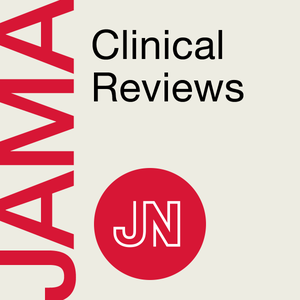 JAMA Clinical Reviews
JAMA Clinical Reviews
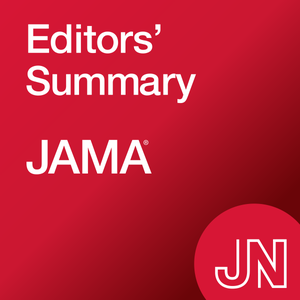 JAMA Editors' Summary
JAMA Editors' Summary
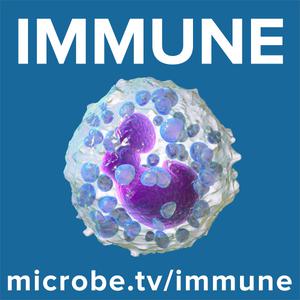 Immune
Immune
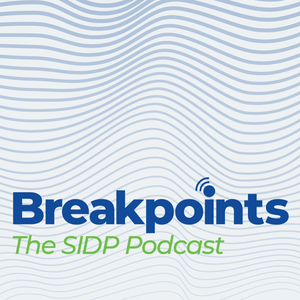 Breakpoints
Breakpoints
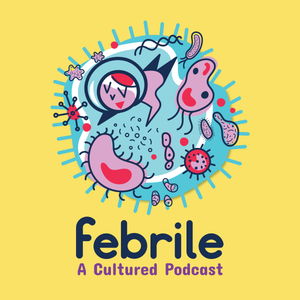 Febrile
Febrile
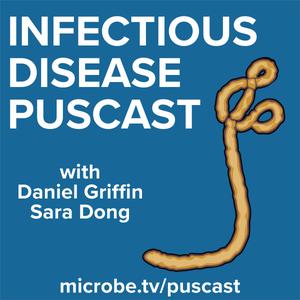 Infectious Disease Puscast
Infectious Disease Puscast